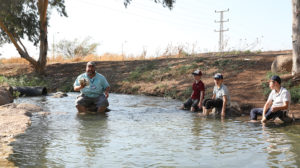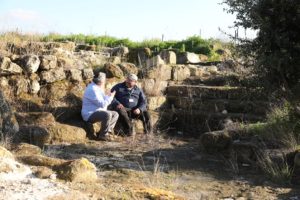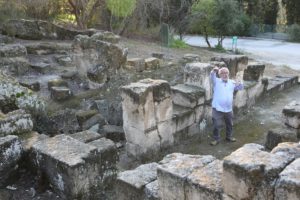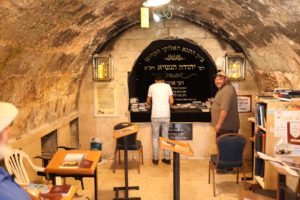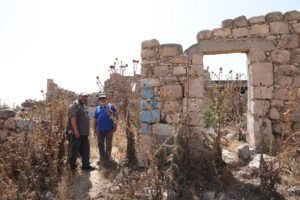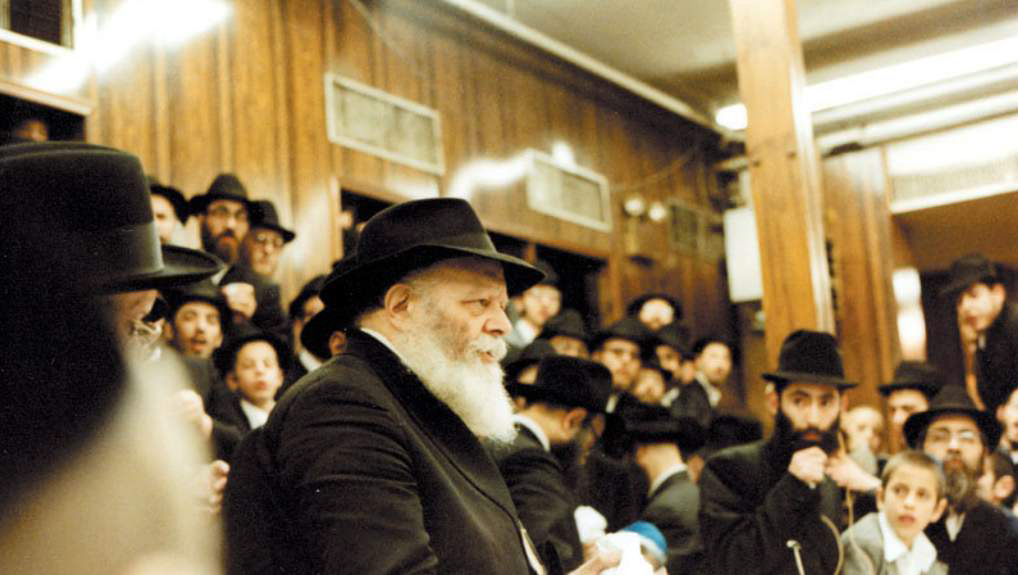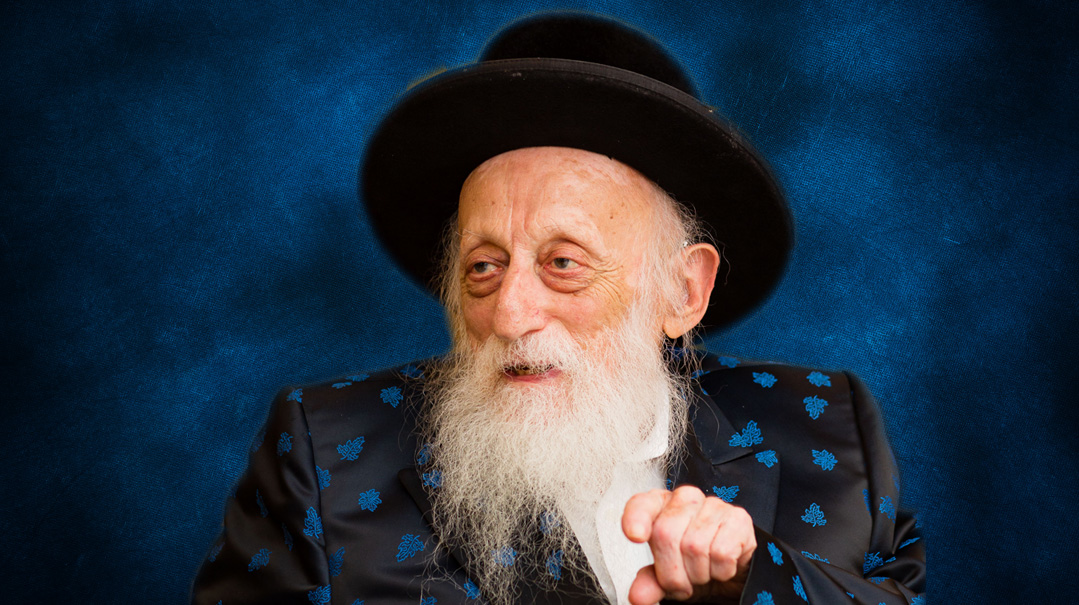The Amazing Adventures of a Globe-Trotting, Treif-Spotting Kashrus Supervisor
| June 5, 2019Meticulous attention to detail, a cool head, and high tolerance for long, uncomfortable journeys are all requirements for Rabbi Danny Moore’s work as a globe-trotting kashrus supervisor. “A mashgiach doesn’t pasken! My job is to see and report the facts on the ground”
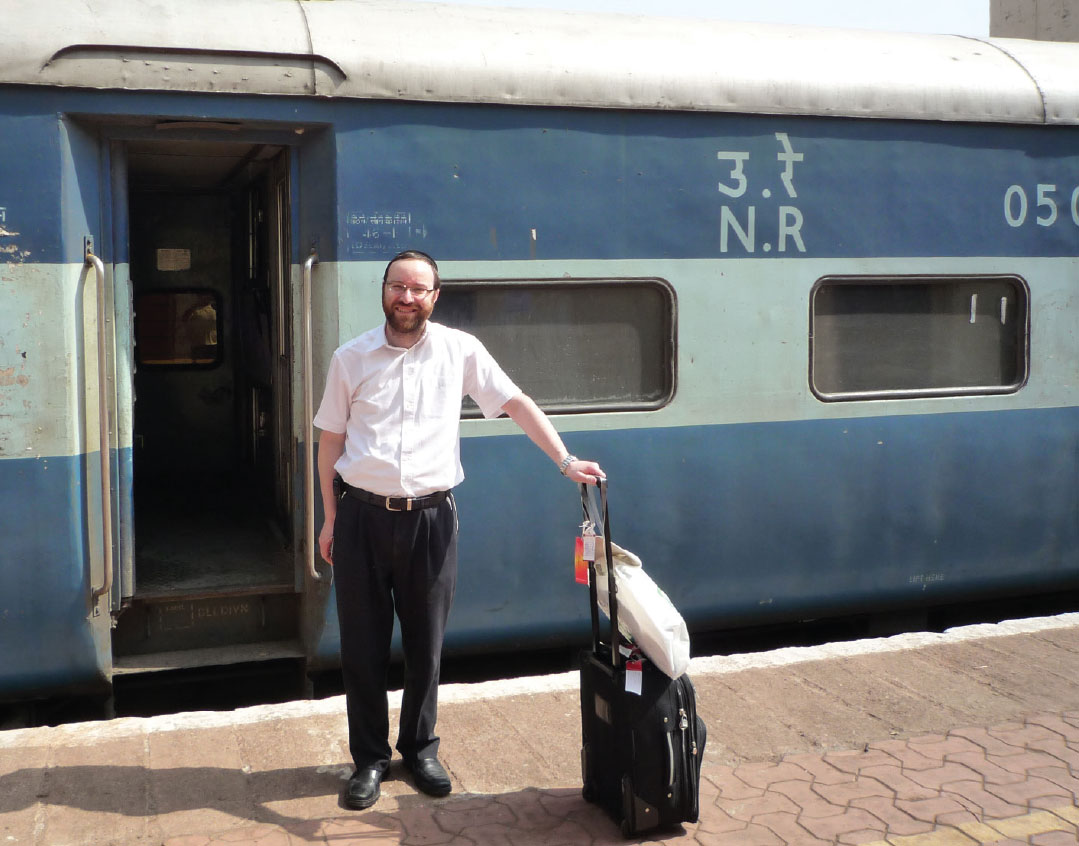
Photos Rabbi Danny Moore
Cornered!
Where: Ratnagiri, Maharashtra, India
Why: “All seemed aboveboard. Then I noticed two locked side rooms.”
How many types of apples can you name? Maybe five or ten? Fifteen? Well, there are as many types of mangoes out there as apples. But the best type of mangoes in the world are Alphonso mangoes, and the best place to cultivate them is in western India.
When a factory in Ratnagiri, Maharashtra, applied for kashrus certification for their mango puree, and in our initial phone conversation asserted that the only product produced in their facility was mango, I knew I’d be making a trip out to the Indian provinces. India is a vast country. Traveling to a village means locating the nearest airport to that province, and then spending hours upon hours in the car.
When I called our contact Satish, a marketing agent in India, he told me the best way to reach Maharashtra was to travel on a 12-hour sleeper train.
“What’s that like?” I asked.
“No worries,” he replied. “I’ll book you in first class.”
It’s not practical to travel to the Far East for just one inspection, so when I do go, I arrange a whole circuit of meetings and factory visits. I try to leave my family for only one Shabbos, which I spend at Chabad in Delhi or Mumbai. Of course, before each visit to the Far East, I have to check that my vaccinations for tropical diseases are up to date.
A few months later, I was met at Delhi Airport by Satish.
The train station was a chaotic horde of people, but we found our platform and boarded the sleeper train together. Then, off to find the first-class carriage. Two layers of spartan wooden bunks awaited.
Satish found our berth. An Indian mother and daughter occupied the “beds” opposite ours.
“Look, Satish, I can’t sleep here. I need a men-only compartment.”
“All right, all right. I’ll find you another place.”
So he did — a wooden bunk just like the first one, but on its own. A railway worker walked along the carriage, throwing a dirty, off-white sheet onto each bunk. Apparently, you were supposed to lay the sheet on your plank and curl up.
There was nowhere else to go. I took off my shoes and lay down.
“Oh, no, keep those shoes on,” Satish warned. “They won’t be there when you wake up.”
Okay. Shoes back on my feet. Baggage under my head. I tried to sleep. It was boiling hot and the sultry air stifled me with clamminess and unfamiliar smells.
“What’s with the AC?” I asked my escort.
“Oh, they have AC in first class. But the people don’t want it. They want it warm, because that’s how they’re used to sleeping.”
We eventually arrived. The only word for that journey was “geferlach.” Needless to state, I hadn’t slept.
We found our hotel; thankfully, it was air-conditioned and adequate. After showering, sleeping off the travel for a good few hours, and davening, I was ready to work.
The Puree Thickens
The factory owner was a Muslim Indian, very unfriendly. Thanks to the British Empire and the BBC, though, most people in India speak English.
He had a prospective American customer for his mango puree, but only if the product was kosher certified. We were shown into the owner’s office, and he showed us a flow chart of his production, alef to tav, raw material to dispatch.
“What other ingredients do you use?” I queried.
“Only mangoes.”
Additives? Preservatives? Colors? Flavors?
Nothing, nothing, nothing, he said.
“I’ve come a long way, and I’d like to see the whole plant,” I said. “Can I have a tour?”
“I have nothing to hide, you can go everywhere,” the owner replied.
And with that, the doors opened. We started in the outgoing warehouse. I walked over to one pallet.
“Oh, don’t look at those labels,” the owner put in quickly. “That’s just for a private customer.”
I didn’t have good vibes, but I followed the whole tour, checking every stage of the production process until the cans are sealed and labeled. All seemed aboveboard.
Then I noticed two locked side rooms.
“What’s in there?” I asked the owner.
“Just odds and ends.”
“I’d like to have a look.”
In the Far East, the boss is always surrounded by several lackeys who fetch and carry for him, so one of those “gabbaim” was dispatched to bring a key. When he brought it, we entered one of the small rooms, which contained spare parts and some old machinery. Fine.
“Can we look in the next room, please? I really like to see everything.”
He wasn’t enthusiastic. “There’s no key here now.”
“I’ll wait. I’ve got time.”
A “gabbai” was sent to bring another key. The second room was a lab. I looked around and opened cabinets. Inside one of them were some small bottles of flavoring.
“The chemist who works here likes to play around, mix things,” the owner said.
Flashing red light: If he has flavorings, he’s adding them somewhere.
My host was tapping his foot. “Are you finished now?”
I said, “There are two more things I want to see: the room where you keep the labels, and the boiler.”
Both of these are important from a kashrus point of view. Labels are very revealing because they contain lists of ingredients, and there may be an ingredient that they’ve forgotten to tell you about. (A mashgiach always checks the delivery notes. If there’s nothing problematic on there, he checks the invoices. And if there’s nothing on there, he checks the labels. That’s a triple safety net.)
The boiler is a possible kashrus issue because the steam could be going to a non-kosher factory next door and returning. I wanted to check that the steam was entirely self-contained.
“All right, let’s start with the boiler,” agreed the owner.
As we climbed up the stone staircase to the boiler room, he looked down and called out something in Hindi to a worker below. He turned back to me and said in English, “Okay, Rabbi, let’s go see the boiler.”
I followed him a couple steps. Then I saw that worker go into a side room, so I doubled back and went after him. He opened a metal filing cabinet, grabbed a bunch of labels and stuffed them into a corner on the floor.
“Rabbi, where are you?”
“Right here.” I ran back up the stairs.
The owner, my guide, showed me the boiler and the pipes, and everything looked fine. Then, the worker called up to him in Hindi, and my guide said, “Okay, Rabbi, can we go down now?”
“Yes, to the labels, please.”
I took some samples of each label. Discreetly, I also picked up two from the pile that the worker had stuffed into a corner and put them in my pocket. They were in an Asian language, I wasn’t sure which.
The tour was over.
“Are you happy with everything you’ve seen?” asked my host.
“Yes, of course. You showed me everything.” (I never give even a hint that I am dissatisfied with kashrus. In some countries, one angry plant owner could make trouble with the immigration authorities or even call in criminal gangs.)
“So can you certify us?”
“It’s not up to me. I have to go back to the UK and write a report for the grand rabbi,” I explained. “He is a holy man and it is his decision.”
Of course, when I arrived home and showed the label to Dayan Westheim, he wanted it translated. This was at the time when three Israeli bochurim were imprisoned in Japan, and I had seen in Hamodia that the local Chabad shaliach had helped them out. I got his number online, called, and told him I work in kashrus and needed a Japanese label translated.
“No problem,” he replied. “Scan and send it to me.”
When the e-mail came back, the ingredients’ list read: “Alphonso mango and grape juice.”
We can’t work with liars.
A day later, the Maharashtra factory owner was on the line. “Do you have an answer?”
I said, “I gave my report to the holy man, but no answer yet.”
He could wait. I had schlepped out on a 12-hour sleepless train journey across the country; he had wasted my time and shamelessly lied.
A week later, he was on the phone again. “What is the decision of the rabbi? My product is packed and ready to go to America as soon as you can give us certification.”
“The answer is no,” I informed him.
“But why not?”
“The grand rabbi says you have grape juice in your facility.”
There was a stunned silence.
“How does he know?”
“I don’t know,” I said. “But he is a holy man, and he speaks to G-d.”
By Invitation Only
Where: Riyadh, Saudi Arabia
Why: “We are cousins of the royal family and we’ll get it authorized.”
What’s it like to be a visiting rabbi in Saudi Arabia? Or Dubai?
When a factory on the east coast of Saudi Arabia applied to us to receive a hechsher, I was scared to travel there. They were manufacturers of a surfactant, which consumers might not have heard of, but it’s an important ingredient in kosher-certified dish soap. A surfactant is the ingredient that reduces surface tension, so the liquid cleaner doesn’t just run off the product, like water on a dry surface.
I told the owners of the factory that honestly, as a religious Jew, I was scared to set foot in the country. Also, you have to put your religion on the Saudi visa application. There was no way I was going to hide the fact that I was a Jew. So I figured I would probably get turned down anyway, and the visit wouldn’t happen.
Wrong. Their reply was, “We are cousins of the royal family and we’ll get it authorized. You’ll have an invitation letter from the Foreign Office and come as a guest of the government.”
O-kaaay.
I wrote to the Saudi ambassador in London explaining that I’d been asked by this factory to come to Riyadh to arrange kosher certification for them, so they could win a contract to export their product. The reply, as my hosts had assured me, was the invitation letter from the Foreign Office in Riyadh.
A non-Jewish associate had told me that his Old Testament had been confiscated at customs, because no non-Muslim religious articles can be brought into the Saudi Kingdom. So I got special permission to take in my tallis and tefillin, which I never travel without.
They meant what they said! I traveled dressed as a Jew and really got the royal treatment. A government escort picked me up at the airport and accompanied me everywhere. In the factory itself, I wore a cap over my yarmulke, because they wanted to keep the Jew’s visit low profile. No one wanted all those workers to go tell their friends that a Jew had been looking around. But in the office, the bosses invited me to take it off. Happily, we were able to give the hechsher.
One Arab, the factory manager, started to question me. “Why in your country they kill Palestinian children?”
I wanted to end the line of questioning, so I replied, “I’m British! I come from the UK, not from Israel.”
He said, “Yes, but in Israel, why do they do that?”
I explained, “Your media say that about Israel, but it is not the reality.”
That guy told me he was from Syria. This was a few years ago, but looking at what’s happening to children in Syria today, his concern for Palestinian children is almost ironic.
Checking Kashrus — & Kevarim
Where: Indonesia
Why: “These people lay abandoned and forgotten in such a far-flung corner. I had to get there.”
First, a little history. From 1800 to 1945, Indonesia was a Dutch colony, known as the Dutch East Indies. It was a valuable territory, thanks to its spice crops, and Jews were among the Dutch citizens who moved there for trade and business purposes.
When the merciless Nazi advance made Europe’s Jews desperate to escape, some Dutch Jews thought war would never reach Indonesia. Also, they couldn’t get visas to any country on earth, but Dutch citizens didn’t need visas to move to a Dutch colony. They therefore made their way to what they thought was a safe haven. Tragically, the Japanese invasion of Indonesia trapped them. The Axis-allied Japanese immediately rounded up all foreigners into concentration camps, where they were treated with incredible cruelty and forced into slave labor. It is estimated that four million people died in Indonesia due to the Japanese invasion. Among them were many Jews.
When Indonesia appeared on my itinerary — my first visit was to Semarang, a second-tier city on the island of Java — I knew I had to look up the Jewish graves. There are seven Dutch cemeteries in Indonesia. First, I found a review on TripAdvisor from a non-Jew who had visited them. His grandfather, a Dutchman, had gone from The Hague to live in Indonesia and was buried there. I reached out to him to ask if he had noticed any Jewish graves, which he had. Realizing that some would be military graves, I also contacted the Dutch War Commission and asked if they could provide me with a list of all the Jewish graves in Dutch cemeteries in Indonesia.
The list the commission sent mentioned three Jewish soldiers in the Dutch army and another 24 Jewish graves. Mostly, these were Yidden born in Dutch cities, although one was from Czernowitz, Romania, and another was Salomon Sassoon, born in Baghdad. One was a child, a girl born in Java in 1941, during the war. These people lay abandoned and forgotten in such a far-flung corner. I had to get there.
When I did, I walked through 3,000 graves. The War Commission had kindly marked with little flags all the Jewish ones on the list they had given me. Some of the tombstones were marked with a Magen David. But others — and I couldn’t believe my eyes — had a Christian cross. These people had been killed al kiddush Hashem, how could they be buried as Christians?!
I turned again to the Dutch War Commission and explained in writing that the cross symbol was offensive to these people’s religious rights. Thankfully, they were understanding and agreed to change the gravestones. Next time I went to Semarang, I saw that the little girl had a Jewishly marked headstone.
In Jakarta, the Indonesian capital, there is also a beis olam with graves of Jews. It’s in the middle of a Christian cemetery. When I first went there, the non-Jewish caretaker told me something very depressing: “No one has been to that section for as long as I’m working here.” Even worse, he said that when he needs more space, he has occasionally removed Jewish graves to use them for Christians. Was this true? Or was he hoping I would be the conduit for some “Jewish money”? Who knows?
I got a few locals to clean up the Jewish section and now it looks much better. I go to Jakarta around once a year to supervise desiccated coconut and coconut sugar production, and I always try to visit the forgotten kevarim of Indonesia.
Kosher & Organic
I traveled regularly to Java, Indonesia, to supervise production of coconut sugar. (The demand for coconut sugar is linked to the rise in popularity of the low GI diet.) We got out to the plantations by motorcycle.
The sugar’s journey starts on the island, where tall coconut palms form a canopy high above. Every 12 hours, at dawn and dusk, the indigenous farmer straps a bamboo bucket to his back and climbs up each of his trees, barefoot, until he is out of sight. Those are the best times to cut the flowers open and bleed the sap. It’s like a cut that bleeds when peeled opened and congeals when shut.
When the farmer brings that sap down, the villagers each take some home to cook on a stove that looks something like a “tanur” from the Mishnayos. The cooking crystallizes the sap, and the villagers then sell their product to traders, who sell it to the factories. The possible kashrus issue is that the crystallizing takes place in private homes, and the villagers could be using their pots for chicken and rice, as well as coconut sugar.
To avoid this problem, we helped the local traders establish a central processing unit. If they want our certification, all the villagers have to bring their sap to be crystallized using the dedicated equipment. Another plus: This system helps them to be certified as organic too.
Perfect, or the Pits?
Where: Marrakech, Morocco
Why: So I said to him, “I like olives. And what I really, really love are olives marinated in wine.”
“Of course, I will find them for you!”
An olive factory in Marrakech, Morocco, was in touch about getting a hechsher for their olives. When I investigated and spoke to people in the olive industry, it seemed straightforward. The only possible kashrus issue seemed to be that some manufacturers marinate their olives in wine.
A Moroccan friend advised me to seek out Rav Shalom Gabbai, an elderly rav living in Marrakech, and ask him about the local olive industry. How would I find him? “Just ask around. Everyone there knows Rav Shalom.”
Fine. I booked my ticket to Marrakech, and then searched online for a minyan. It seemed there was just one minyan for Shacharis. I got on the phone to the gabbai, Yitzchak Kochayon, and asked him for the address of the shul.
“No address! It’s in the Old City. There’s just one building after another. You know what? Tell me which hotel and I will pick you up at 7:15 and bring you to the minyan.”
At 7:15, I was waiting in the lobby. Kochayon, a middle-aged Jew in Moroccan garb, drove up in a small car. He asked me to sit in the back, as he had to pick up someone else. Someone else turned out to be an elderly Yid with a long beard. We said shalom aleichem and exchanged names. He was Rav Shalom Gabbai!
Having lived in Marrakech all his years, Rav Gabbai knew everything about the city’s 27 olive factories. “No wine, no vinegar, no problems,” he reassured me. I felt like I had done some of my day’s work before Shacharis.
Walking with them through the Old City, I could see no sign of the 500-year-old Salat Al Azama Beit Knesset. It’s accessed through a nondescript alley, but when you enter the courtyard there is a beautiful complex, with striking mosaic floors and many rooms. Once, there were eight minyanim for Shacharis, but today they struggle to get one. After the minyan, the men stay in the shul courtyard to eat pita at a communal breakfast.
After Shacharis, the gabbai said he had to get to work in the marketplace, but he’d arrange a ride for me back to my hotel. We’d left the car outside the Old City. Inside, donkeys walked the narrow alleys, women carried baskets of pita bread on their heads, and I felt a bit out of place in Ashkenazic dress. Then an Arab roared up on an ancient, dusty motorcycle and stopped inches from my feet. Yitzchak Kochayon waved me onto the vehicle.
“This is my worker. He will take you back.”
“You sure it’s safe?”
“I’m telling you, he’s my worker. Just get on!”
My tallis and tefillin were in front of me, then came my arms, tight around his stomach. My first ride on a motorcycle, I was a helpless pillion passenger. We sped down lanes and lurched around corners of this unfamiliar Arab city. “Slow down!” I screamed. But the driver spoke no English. Fifteen minutes later, I was in front of my hotel, shaken up but in one piece.
I did my best to thank him, and waved my camera, saying “I need a photo for my wife!” (Her reaction? “Danny, this looks even worse than I imagined.”)
After a whole day’s inspection at the olive factory, we were done. I watched the workers, mainly women, add saltwater to the barrels of olives to pickle them. Each enormous barrel, filled with olives and saltwater, gets rolled twice a week to better allow the salt to penetrate the olives.
The Salat Al Azama shul has a minyan for Shacharis only. Arvit was in the shul of Rav Pinchas Hacohen in the Medina district of the Old City. Rav Shalom Gabbai gave a Gemara shiur on Masechet Chullin, in Arabic, and then we davened.
I still had time the next day before my flight. The factory owner offered me a tour guide. “You have to see the local market. Marrakech has the biggest shuk in the whole Middle East! Snake charmers, pastries, any food you like, a whole section of olives.”
My guide, who was really keen to help, gave me a whole speech about it too. So I said to him, “I like olives. And what I really, really love are olives marinated in wine.”
“Of course, I will find them for you!”
The shuk was fascinating and colorful. Fresh, pungent spices, carpets hung up for sale, poisonous black snakes, and endless varieties of nuts. All 27 of the olive factories in Marrakech have their own stalls in the marketplace, a vast array of green and brown varieties, spiced, pickled, flavored, any olives you can think of. I stood back and watched as my guide asked 15 or 16 stall owners if they had any olives marinated in wine or vinegar for a tourist. Nothing.
I listened to him pleading in French and gesticulating. At the end, one of the sellers threw up his hands. “He wants olives in vinegar? So let him take a bottle of vinegar and pour it over the olives! No olives in vinegar in Marrakech.”
I had my final answer.
Chocolate Hisses
Where: The other side of an ash cloud
Why: “On Sunday night, fly Mumbai to Istanbul, Istanbul to Milan, take the train to Zurich, and from there they’ve put on a bus service to England. Got it?”
Hot chocolate and brownies have their delicious roots in the humble cocoa bean. When a cocoa company from Ghana became interested in kosher certification, I explained to them that kosher supervision needed to start not from their own factory, but from the cocoa bean plantation, out in the bush. As it was intended to be a Pesach product, we needed to check that there was no wheat or barley growing in close proximity to the cocoa plants.
From Accra, the capital, we drove in a four-wheel-drive vehicle out to the bush. The roads there are not like the M1 and the M6 highways in England; they are dirt tracks through the jungle, and your stomach starts to hurt from the shaking. We eventually came to a clearing, off the road, deep in the bush — a cocoa tree plantation. On the barks of the trees, cocoa pods grew, big and brown and about the size of an average esrog. Fascinated, and with my eyes glued to these brown pods, I walked through the high grass toward a tree. All of a sudden, the tracker whom we had brought along hissed one word: “Snake.”
I ran back to the car, shaking.
“You shouldn’t have moved fast,” he told me. “With snakes you need to move slowly. Sudden movement can make them follow you.”
Good advice. But let’s hope there won’t be a next time.
On the Run
My first trip to India as a mashgiach was in 2009, just four months after terrorists stormed the Chabad House in Mumbai, murdering the Holtzbergs Hy”d — and some mashgichim who were in India for kashrus supervision. Everyone was scared, but several factories were waiting for our inspection.
Since then I’ve been back many times, including a trip a year later, in 2010. I left home the day after Pesach to spend two weeks in India, doing the rounds.
The day of my return began with an uneventful flight from the regional airport to Mumbai. The next stages were neatly lined up: British Airways from Mumbai to London, followed by a connection to Manchester. As I left, my wife called to tell me that British airports were closed, due to ash clouds from a volcano.
But at the Mumbai airport, the BA flight was showing as delayed. The staff was super polite, as ever, but didn’t know much. After a few hours, I called Benzy Adler, my travel agent in London. He confirmed that there really was a volcano in Iceland spewing such a quantity of ash cloud that all airports in England were closed to incoming flights. Benzy said the last flight to depart from Heathrow before its closure had been bound for Mumbai, so he was sure that as soon as the airport reopened, the plane would return.
Problem was, no one knew when the ash cloud crisis would be over. This was Thursday and the hours were ticking by. There was no way I could be back home for Shabbos.
Resigned, I checked into a hotel. I had packed exactly what I thought I’d need, so I had no food left, and not a shred of clean clothing either. The food problem was sorted out by spending a beautiful Shabbos at Mumbai’s Chabad House. The hotel laundry took care of my clothes.
Motzaei Shabbos, Benzy Adler was on the phone with a new itinerary for me. “Most of Europe’s airports are closed, but Milan is still open. On Sunday night, fly Mumbai to Istanbul, Istanbul to Milan, take the train to Zurich, and from there they’ve put you on a bus service to England. Got it?” He booked me and gave me the flight numbers.
Meanwhile, I had arranged to work on Sunday in Mumbai, checking silver foil that needed a hechsher for Pesach. Sunday evening, I went back to the airport and took off to Istanbul. It seemed like I was on my way home.
In Istanbul, I dashed through the transit area to make my flight to Milan. But the flight wasn’t leaving. Crowds were milling around. What was going on? I dialed Benzy Adler.
“Danny, Italian airspace has just been closed,” he informed me.
“Now I’m worse off than before,” I told him. “I’d rather be stuck in Mumbai than Istanbul.”
“Okay, you’re right, we need to get you out of Istanbul. Go to the departure screen and tell me what flights you see and I’ll tell you what we can get you on.”
Flight one was headed to Tehran. Flight two to Beirut. Flight three was to Tel Aviv. Bingo! Except it was taking off in 40 minutes.
“Okay, I booked you,” Benzy said, clicking furiously. “Run to the plane.”
I had to get a visa first, and then check in. A guy with an earpiece waited at the desk.
“Where are you leaving to?”
“Tel Aviv.”
“When did you come to Turkey?”
“Twenty minutes ago.”
He let me through.
But at the gate, the staff said the flight was closed. Desperate, I begged with all my might. “Please, my flight only landed here 20 minutes ago, I’ve been stuck in Mumbai for three days and have to get home to my family.”
“What’s your name? Moore? You’re not listed on this flight anyway!”
“Yes, I’m booked on this flight.”
“I looked already and you’re not here. Wait!” Her eyes had automatically flicked back to the screen. “Hey, you are here! Strange. Just a minute ago you weren’t.”
I ran down the boarding sleeve and entered the Turkish Airlines plane, huffing and puffing, just as the doors closed.
When I was waiting in transit I had seen a heimishe passenger, no one I recognized, and we’d greeted each other. He had been bound for Moldova, but his flight was canceled so he decided to quickly get back to Eretz Yisrael. Now he saw me on the plane and came over, glowing with welcome.
“Shalom aleichem! You couldn’t get back to Europe, right? You’ll be my guest in Bnei Brak for a few days!”
I was happy to get home to Manchester before the next Shabbos.
(Originally featured in Mishpacha, Issue 763)
Oops! We could not locate your form.


